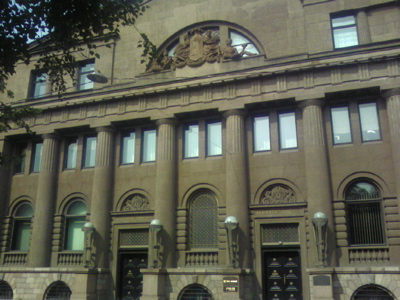Fear of Russia, Kaunas
What Russia does to Lithuania? Its cultural ‘imperialism’ in the form of TV broadcasts and sustained popularity of Russian music among certain classes of my fellow citizens is a joke – or rather, it appears dangerous only if coupled with real pressures – ‘oil embargo’ (as Brzezinski puts it in TIME) and, more broadly, by Russian qualities that decidedly do not belong in Europe in the 21st century, for example, the racism that represents Russian human rights situation. Tellingly, Lithuanian politicians are either dismissive or paranoid about that. They have nothing to say about human rights in Russia, and I doubt many of them are fully aware of it as a concept, but you can always rely on the Conservatives to notice every little piece of Russian TV propaganda and be very dramatic and endlessly agonizing about it.
Fear characterizes the modern Lithuanian character. Lack of identity? I am tempted to believe that what America will ultimately achieve in Iraq will be similar to what the forcefully-brought Communism did to Lithuania. It destroyed the values and interconnectedness within society. Lithuania is being remade as I write, and Fukuyama’s end of history is nowhere in sight yet. Still, Lithuania would be better off if it came back to ‘traditional’ values cast in the inter-war period in Kaunas, the temporary capital. Kaunas is likely the last piece of genuine history Lithuania has left.

Bank of Lithuania in Kaunas, circa 1927